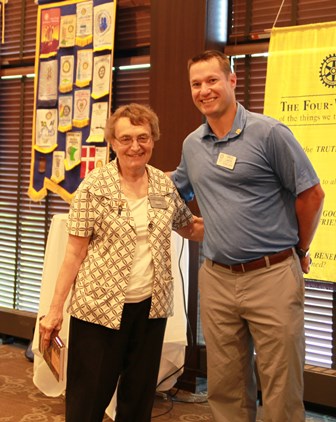Fast for Hope

PDG Karel Weigel, Greg LaMere
The Fast for Hope Initiative started in 2007 is based on the belief that while projectbased funding is critical to address immediate needs in developing parts of the world, a new model needs to be created in order to more effectively address the problem of systemic poverty in the world. This new model is based on a belief that the local community knows best what they need and that the community must take ownership of any solution in order for it to be successful. Finally instead of doing a
project in multiple communities, this is intended to be a multifaceted effort simultaneously addressing the myriad of needs that are interconnected and which cause the residents of one or two particular communities to live in extreme poverty.
GOAL
Goal is to create a replicable and sustainable model to address extreme poverty in the developing world. The issues will vary community to community, but may include lack of access to education, lack of access to transportation and markets, limited experience organizing as a community, culture of dependence on charity. In 2015, with assistance from a District Grant, El Corozo
A key to our approach is to build relationships before we build stuff.
Part of what creates sustainability is building capacity of the residents of El Corozo. Historically communities organize around the family so little experience organizing as a community, how to call meetings, how to make group decisions, how to elect leaders, how to reach consensus, how to organize into different work groups, how to raise funds.
Because of the extreme poverty there has become a culture of dependence, to seek help from others and to follow the directions of government leaders. Important for the community to realize that their voice, thoughts and dreams matter.
District 5960 Invited El Corozo, Nicaragua to join us in this initiative in spring 2012. Efforts really started to get underway in fall 2012.
WHERE ARE WE NOW
Started a reading project. Like a book mobile but in homes. Run by volunteers.
Pharmacy – We purchase two advanced first aid kits. Several community members completed training. Community now trying to determine where they should be located and how much to charge so that supplies can be replaced.
Road. The road is impassible during the raining season and hardly useable during the dry season. About 3.2 miles in length. The road is used to attend High School, to get to work, to conduct trade, for medical care, etc. The road serving the community is in two municipalities. After about a year of effort, the two mayors agreed to conduct a survey of the road. They then promised to design the road and to prepare a cost estimate. They promised to have this done by the end of June 2015, but have failed to do so. The community is in regular contact with the mayors, the respective municipal councils and other government agencies to remind them of the promises and to advocate for the completion of the studies. While that has been very frustrating, it has been an opportunity for the community to learn how to advocate for themselves. This is a major accomplishment. It is also important to remember that while by our standards things seem to be moving slowly, we also need to remind ourselves how long it would take to build a new road in our country, if we were starting at the initial concept stage.
The community has a laptop computer so they can more easily communicate with the outside world.
The community has incorporated in their curriculum a program on entrepreneurship. This is for the upper grades of the elementary school and is in its second year.
Opportunity International is an international organization focused on micro-lending, but in Nicaragua they are exploring a new approach to improving the agricultural practices of poor rural farmers and in providing them with alternative markets for their products.
How can you participate?
- Participate in a cultural delegation. Any Rotarian can participate and spouses and significant others are also often invited. You will have an opportunity to meet the people, to see the country, to learn about the history and to see the work you are helping to fund.
- Continue to provide financial support. This effort is not funded through the Foundation. (At the same time, Fast for Hope has successfully applied for and received District Grant Funds.)
- Have members of the Fast for Hope Steering Committee present to your club.